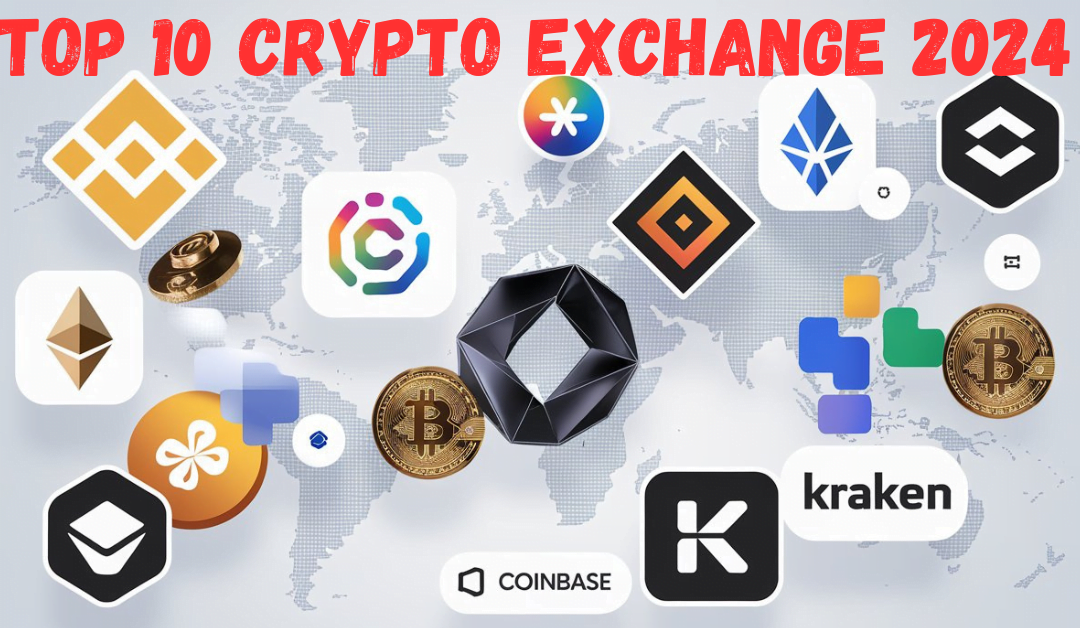Choosing the right cryptocurrency exchange is crucial for anyone interested in buying, selling, or trading digital assets. With so many options available, it can be so difficult to find which platform is best for Us. Factors like security, fees, user experience, and the range of supported cryptocurrencies all play an important role. In this article, we will review the top 10 crypto exchanges in 2024, covering their key features, pros and cons, so that it can help you make a decision.
1. Binance
Overview: Binance is one of the world’s largest and most popular cryptocurrency exchanges by trading volume.
Key Features:
- Supports more than 500 cryptocurrencies
- Low trading fees, especially with BNB token usage
- Advanced trading tools and options like futures and margin trading
Security: Binance has robust security measures, including two-factor authentication (2FA), a withdrawal whitelist, and a Secure Asset Fund for Users (SAFU) that acts as an insurance fund to protect users.
Pros:
- Wide range of crypto coins
- Low fees
- High liquidity
- Ideal for regular traders
Cons:
- Complex interface for beginners
- Regulatory issues in some countries
- Customer Support Challenges
2. Coinbase
Overview: Coinbase is one of the most user-friendly exchanges because its interface is very simple, especially for new investors. One of the best things I like most about this platform is the high liquidity in listed coins and also the selection of the coin for the exchange.
Key Features:
- Simple interface, ideal for newcomers
- High-security standards with insurance on USD balances
- Support for major cryptocurrencies like Bitcoin, Ethereum, and Litecoin
Security: Coinbase is known for its strong security practices, including cold storage for the majority of user funds.
Pros:
- Easy to use
- High security
- Regulated and compliant with U.S. laws
Cons:
- Higher fees compared to other exchanges
- Limited listed coin
3. KuCoin
Overview: KuCoin is a popular exchange for trading a vast range of altcoins, offering competitive fees and a user-friendly interface. This exchange also supports derivatives trading.
Key Features:
- Supports a large number of cryptocurrencies, including lesser-known altcoins
- KuCoin Shares (KCS) offers trading fee discounts
- User-friendly mobile app
Security: KuCoin has solid security features, including 2FA, micro-withdrawal wallets, and multi-layer encryption.
Pros:
- Extensive range of cryptocurrencies
- Low trading fees
- User-friendly interface
Cons:
- Not as regulated as some competitors
- Occasional technical issues
4. Kraken
Overview: Kraken is one of the most respected cryptocurrency exchanges in the industry, having launched just two years after Bitcoin in 2011. Kraken is known for its strong security and wide range of features, making it a favourite among more experienced traders.
Key Features:
- Margin trading, futures, and staking options
- More than 230 cryptocurrencies
- Competitive fees, especially for high-volume traders.
- Support fiat currencies including USD, EUR, GBP, and CAD
Security: Kraken employs industry-leading security measures, including 2FA and cold storage for most of its digital assets, and a $100 million insurance fund to protect against losses.
Pros:
- Advanced trading options
- Good customer support
- Never suffered a security breach(Strong security)
- Mobile app and desktop versions available
Cons:
- The interface may be complex for beginners
- High Fees for Beginners
- Lack of P2P, Bot, and Copy Trading
- Verification process can be lengthy
5. Gemini
Overview: Gemini is a U.S.-based exchange known for its regulatory compliance and strong security features, making it a trustworthy option for traders.Founded by the Winklevoss twins in 2014.
Key Features:
- Institutional-grade security
- User-friendly interface with a clean design
- Supports 70+ cryptocurrencies
- Good for Crypto-to-crypto trading
Security: Gemini places a strong emphasis on security, with most assets held in cold storage and digital asset insurance.
Pros:
- Highly secure
- Regulated and compliant with U.S. regulations
- Easy to use
Cons:
- Absence of Major Coins(XRP and Cardano)
- Higher fees than some other exchanges
- Limited Staking Options, and no Margin facility
6. Huobi Global
Overview: Huobi Global is a well-known exchange offering a wide range of trading options, including spot, margin, and derivatives trading.
Key Features:
- Supports over 300 cryptocurrencies
- Offers margin trading, futures, and staking
- Competitive trading fees
Security: Huobi employs several security protocols, including 2FA and cold storage for digital assets.
Pros:
- Wide range of trading options
- Low fees
- Strong security
Cons:
- Interface can be overwhelming for beginners
- Regulatory concerns in various countries
7. Bitfinex
Overview: One of the longest-running exchanges, known for its advanced trading features and a large selection of altcoins. It is designed for experienced traders.
Key Features:
- High liquidity for major cryptocurrencies
- Advanced trading tools and charting options
- Competitive fees for high-volume traders
Security: Bitfinex has faced security challenges in the past but has since implemented robust security measures, including 2FA and withdrawal protection.
Pros:
- High liquidity
- Advanced trading features
- Competitive fees for large trades
Cons:
- Past security breaches
- Complex for beginners
- Not transparent
8. OKX (formerly OKEx)
Overview: OKX is a major exchange known for its extensive range of trading options, including futures and derivatives, catering to both retail and institutional investors. It supports over 530 cryptocurrencies and 500 trading pairs.
Key Features:
- Wide range of cryptocurrencies and trading options
- Competitive fees, especially for futures trading
- Advanced trading platform with robust features
Security: OKX has a strong reputation for security, with no major hacks reported. This exchange follow industry-standard security practices, including cold storage and multi-factor authentication.
Pros:
- Extensive trading options
- Low fees for derivatives trading
- Powerful Trading Tools
Cons:
- Complex interface for beginners
- Regulatory challenges in some country
- Limited Payment Options
9. Bybit
Overview: Bybit is a leading platform for derivatives trading, It offers high-leverage trading and it’s famous for deep liquidity for professional traders.
Key Features:
- Leverage trading options up to 100x
- High liquidity in derivatives markets
- Good interface for experienced traders
Security: Bybit emphasizes security with features like 2FA, cold storage, and insurance funds.
Pros:
- Excellent for derivatives trading
- Providing NFT Marketplace
- Over431 cryptocurrencies listed
Cons:
- Not ideal for beginners.
- Limited spot trading options.
- Limited Fiat Support
10. Crypto.com
Overview: Crypto.com offers a comprehensive ecosystem, including an exchange, wallet, credit cards, and staking options, making it a versatile platform for crypto investors and traders.
Key Features:
- Integrated ecosystem with multiple crypto services
- Competitive fees with CRO token discounts
- Wide range of supported cryptocurrencies
Security: Crypto.com is known for its strong security measures, including insurance coverage for digital assets and cold storage.
Pros:
- All-in-one crypto platform
- Competitive fees
- Strong security
- Suitable for both beginners and seasoned traders
Cons:
- Customer support can be slow
- Fewer cryptocurrencies available
- Higher trading fees for beginners who do not stake CRO
Conclusion
That’s all from my side! Choosing the right crypto exchange depends on your specific needs, whether you’re looking for low fees, a user-friendly experience, or advanced trading features. Each exchange on this list offers something unique, so take the time to consider which one exchange is best with your trading goals.

